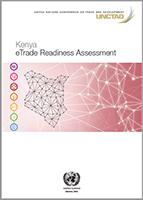
The eTrade for all initiative, launched at the fourteenth session of the United Nations Conference on Trade and Development (UNCTAD XIV) in July 2016, is a concrete example of how to mobilize the digital economy to support the 2030 Agenda for Sustainable Development, including Sustainable Development Goals 5, 8, 9 and 17.
This initiative aims to raise awareness, enhance synergies and increase the scale of the international development communityfs efforts to strengthen the capacity of developing countries to engage in and benefit from e-commerce, addressing seven relevant policy areas:
- E-commerce readiness assessment and strategy formulation
- ICT infrastructure and services
- Trade logistics and trade facilitation
- Payment solutions
- Legal and regulatory frameworks
- E-commerce skills development
- Access to financing
The eTrade Readiness Assessment of Kenya presents a detailed analysis of the national e-commerce ecosystem and highlights many positive reforms by the Government over the last decades which have resulted in equipping the country with a robust ICT infrastructure, extensive transport and logistics networks, and enabling legal frameworks for ICT and the digital economy. Private sector investments have also been essential in supporting these developments, which have collectively resulted in increasing Internet adoption, mobile money innovation, and uptake of digital devices.
However, several challenges to the development of e-commerce remain, including a need for increased public sensitization on e-commerce related laws and compliance by duty bearers; digital divides pertaining to the uptake of digital devices, mobile network coverage, and last-mile broadband connectivity; as well as digital skills deficit and mismatch between curricula in institutions of higher learning and labour market demands.
The assessment is the result of a wide consultative process that brought together representatives of the public, private sector, consumers and development partners and integrates both quantitative and qualitative data. Since this assessment was conducted during the COVID-19 pandemic, it brings to light the impact of the pandemic on e-commerce in the country. It concludes with recommendations for measures to further promote the country’s digital transformation and will form the basis upon which the national E-commerce Strategy for Kenya will be developed.
The assessment was prepared with the financial and technical support of the Deutsche Gesellschaft für Internationale Zusammenarbeit (GIZ) GmbH.


